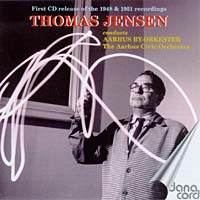The Aarhus Civic Orchestra was formed from the Aarhus
Philharmonic Society and Theatre in 1935 and Jensen Ė not yet the name
he was subsequently to become Ė had taken the position of conductor
back in 1927. The 1935 reorganisation led in time to a greater orchestral
strength and also to a series of recordings, the first in fact to be
made in Denmark outside Copenhagen. Jensen was to stay in Aarhus for
fully thirty years and these recordings, from 1948 and 1951 were all
made for Tono and were of fairly light music.
Jensen rips nicely into Kuhlauís Shakespearean overture
and shows his lyrical imperative in Tarpís Suite on Danish folk tunes,
The Raven. The violins arenít quite together here but Jensen phrases
with unselfconscious refinement with the wind principals making a good
showing and the ebb and flow of the line delineated with care and skill.
The Aubade from Massenetís Le Cid is delicious and Navarraise
swaggers delightfully. Elgarís Serenade for Strings receives a bracing
reading; the string section sounds quite small and the playing is unmannered
in the opening movement, and has an attractive intimacy in the Larghetto
diametrically opposed to, say, Sargentís yearning grief. Jensen shapes
the lower strings nicely in the Allegretto, the answering phrases nicely
handled. It was here that I worried about the transfer. It seems to
me that thereís been too strong a treble cut. The Tonos of around this
time could be noisy in a way recognisable from Deccas of a slightly
earlier vintage and one way around the problem is to cut higher frequencies,
which seems to have been done here.
Elgarís Salut díamour is put, thankfully, on
a sugar-free diet and Møllerís Aarhus Tattoo, whilst admittedly
not the most sophisticated of pieces, rather tickled me. The Debussy
is somewhat earthbound Ė even though the violas and winds are otherwise
not unattractive. Of the remainder of these tidbits the Marche Slave
generates commendable drive Ė and Danacord are honest about the
astounding tape join imbedded in the original Ė and I like the way the
trumpets resist the temptation to blare. The Smetana is fine; sprung
fiddles, good first trumpet with the witty woodwind flecking the score
delightfully. Of the Strauss pieces I enjoyed most the Tritsch-Tratsch
Polka, which is nicely done.
The miscellaneous collection will have its constituency.
Jensen admirers will like his unaffected directness and those interested
in the orchestral byways of post-War Danish musical life will give a
listen to these genial discs, complete with good notes.
Jonathan Woolf
See
also review by Chris Howell


